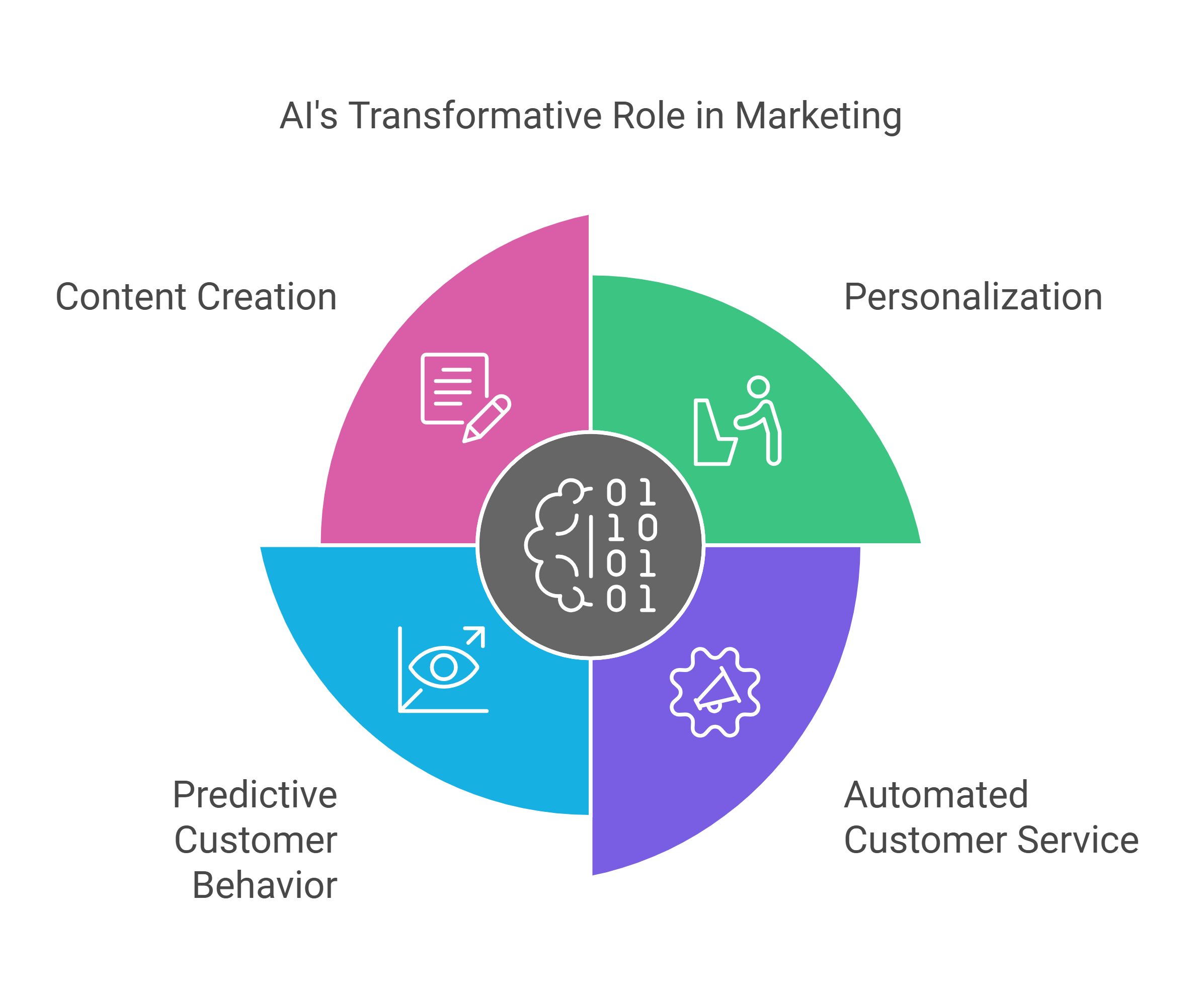Exploring Uncharted Territories: Marketing in a Global, Diverse, and Evolving Environment
Navigating the Digital Frontier
The impact of digital technologies on marketing practices has been profound and far-reaching, evolving rapidly over the past few decades. This digital transformation has revolutionized how businesses connect with consumers, analyze data, and make strategic decisions[1][2].
The Rise of Digital Marketing
Digital marketing has grown significantly over the years. Below is a summary of important factors that contributed to its rapid growth.
Web 1.0 and E-commerce
The advent of the internet marked the beginning of digital marketing. Initially, websites served as digital brochures, providing basic information about products and services. As e-commerce capabilities developed, businesses began selling directly to consumers online, fundamentally changing retail landscapes.

Social Media and Web 2.0
The emergence of social media platforms and Web 2.0 technologies transformed marketing into a two-way conversation. Marketers gained the ability to engage directly with consumers, gather real-time feedback, and build brand communities. This shift necessitated new strategies for content creation, community management, and reputation monitoring.

Mobile Revolution
The proliferation of smartphones and tablets ushered in the era of mobile marketing. This development required marketers to adapt their strategies for smaller screens and on-the-go consumers, leading to the rise of mobile-optimized websites, apps, and location-based marketing techniques.

Data Analytics: The Game Changer
As digital technologies matured, the volume of data generated by online interactions grew exponentially. This big data revolution transformed marketing decision-making processes:
- Customer Insights: Data analytics tools enabled marketers to gain deeper insights into customer behaviour, preferences, and purchasing patterns. This information allowed for more targeted and personalized marketing campaigns.
- Performance Measurement: Digital technologies made it possible to track and measure marketing efforts with unprecedented precision. Marketers could now analyze the return on investment (ROI) of their campaigns in real-time and make data-driven decisions to optimize performance.
- Predictive Analytics: Advanced analytics techniques, including predictive modeling, empowered marketers to forecast trends and customer behaviours. For example, Amazon uses predictive analytics to optimize inventory management based on anticipated customer demand.

The AI Revolution in Marketing

Building on the foundation of digital technologies and data analytics, artificial intelligence is now driving the next wave of marketing innovation through:
- Personalization at Scale: AI enables hyper-personalization of marketing messages and experiences. Netflix, for instance, uses AI algorithms to recommend content based on individual viewing history, significantly increasing user engagement.
- Automated Customer Service: AI-powered chatbots and virtual assistants are revolutionizing customer service. These tools provide 24/7 availability and faster response times. H&M’s AI-powered chatbot, for example, assists customers with product recommendations and purchase decisions.
- Predictive Customer Behaviour: AI’s ability to process and analyze vast amounts of data allows marketers to predict customer behaviour with greater accuracy. This capability enables more effective targeting and timing of marketing campaigns.
- Content Creation and Optimization: AI tools are increasingly being used to generate and optimize marketing content, from email subject lines to social media posts. This automation allows marketers to produce more content and test variations quickly.

Ethical Considerations and Future Skills
As AI becomes more prevalent in marketing, ethical concerns such as data privacy and algorithmic bias need careful consideration. Marketers must navigate these issues while leveraging AI’s potential.
To thrive in this AI-driven landscape, marketers will need to develop new skills, including data analysis, machine learning, and creative problem-solving. The ability to blend these technical skills with traditional marketing expertise will be crucial for success.
“What Will Happen to Marketing in the Age of AI? | Jessica Apotheker | TED” [10:43 min] by TED[3]
If you are using a printed copy, you can scan the QR code with your digital device to go directly to the video: What Will Happen to Marketing in the Age of AI? | Jessica Apotheker | TED” [10:43 min] by TED

The digital transformation of marketing continues to accelerate, with AI at the forefront of innovation. By understanding this evolution and embracing new technologies, marketers can create more effective, personalized, and impactful strategies in the digital age.
Example
The Rise of AI in Tourism: Transforming Travel Experiences
Artificial intelligence (AI) is rapidly reshaping the tourism industry, offering innovative solutions for both travelers and tourism professionals. This technological revolution is impacting various aspects of travel, from trip planning to on-site experiences[4][5][6].
AI Adoption in Travel Planning: The growing interest in AI for travel planning is evident, with approximately 30% of people having used or considering using AI for future vacation planning. This trend is particularly pronounced among younger travelers, with adoption rates potentially reaching 70%. Such high engagement rates suggest that AI could significantly impact traditional travel planning methods, potentially challenging the relevance of physical guidebooks.
Industry-Wide Implementation: Tourism professionals are increasingly leveraging AI to enhance customer experiences and streamline operations. Major players like Club Med, Booking.com, Airbnb, airlines, tourist offices, and hotel chains are at the forefront of AI adoption. In fact, 90% of tourism stakeholders at the European level are either extensively using AI or planning to implement it soon.
AI in Airport Operations: Airports are embracing AI and other technologies to optimize passenger journeys. Investments in travel technology are projected to increase by 14% in 2024. Notably, 60% of airports plan to implement biometrics in their control systems by 2029, focusing on AI, data analysis, digital payments, and augmented reality.
Managing Visitor Flows: AI systems are being developed to predict daily attendance at popular tourist sites and museums by analyzing factors influencing visitor behaviour and using historical data. This approach aims to facilitate smoother visitor arrivals and improve overall management.
Enhancing Cultural Experiences: In the cultural sector, AI is revolutionizing visitor experiences through augmented reality and interactive technologies. Museums are exploring generative AI to offer immersive experiences, allowing visitors to explore different times and spaces and interact with artworks or monuments using connected glasses, virtual reality headsets, or touchscreen tablets.
AI in Transportation: The transportation sector is also seeing significant AI integration:
- Japan is planning to introduce AI-powered automated high-speed trains, including the Shinkansen, within the next decade.
- A new facial recognition system in Japan allows passengers to board trains without tickets or transport cards, using AI and cameras for identification and automatic fare charging.
Challenges and Considerations: While AI offers numerous benefits, it also presents challenges:
- The creation of fake AI-generated travel guides is becoming a concern, highlighting the need for consumers to be cautious and rely on reputable sources.
- Privacy and ethical concerns surrounding biometric data collection and use in travel settings need to be addressed.
As AI continues to evolve, its impact on the tourism industry is expected to grow, offering more personalized, efficient, and immersive travel experiences. However, balancing technological advancements with privacy concerns and maintaining the human touch in travel experiences will be crucial for the industry’s future.
Example
HelloBC AI Concierge
Destination BC has launched a beta test of the HelloBC AI Concierge, an innovative chatbot tool designed to enhance digital visitor servicing on their consumer website, HelloBC.com[7]. This AI-powered assistant provides 24/7 support for general tourism inquiries, offering customized trip planning assistance and destination insights. The Concierge draws information from HelloBC.com, a network of over 30 destination management organization partners, popular attractions, and ski resorts across British Columbia.
Key Features of the HelloBC AI Concierge:
- Round-the-clock availability for immediate, tailored information
- Comprehensive data on attractions, activities, accommodations, and itinerary suggestions
- Continuous learning and improvement through user interactions
- Integration with Destination BC’s Digital Strategy and Tourism Data Hub
This initiative demonstrates the application of AI in tourism marketing, showcasing how technology can be leveraged to improve the visitor experience and support the tourism industry. The AI Concierge represents a significant step in digital innovation for destination marketing organizations, offering personalized assistance that meets the growing expectations of travelers for instant, real-time information during their trip planning process.

Media Attributions
- Figure 1: “Online, E-commerce, Shopping” by andrespradagarcia (2021), via Pixabay, is used under the Pixabay content license.
- Figure 2: “Social media, Social networks, Icons” by BiljaST (2021), via Pixabay, is used under the Pixabay content license.
- Figure 3: “Ecommerce, Online, Marketing” by QuinceCreative (2018), via Pixabay, is used under the Pixabay content license.
- Figure 4: “Hand, Business, Technology” by 4832970 (2017), via Pixabay, is used under the Pixabay content license.
- Figure 5: “AI’s transformative role in marketing” [created using Napkin.ai] by the author is under a CC BY-NC-SA 4.0 license.
- Figure 6: “An artist’s illustration of artificial intelligence (AI)…” by Khyati Trehan and Google DeepMind (2023), via Pexels, is used under the Pexels license.
- Figure 7: “A Person in Brown Leather Jacket Holding Silver Reception Bell” by Mikhail Nilov (2021), via Pexels, is used under the Pexels license.
- Lamberton, C., & Stephen, A. T. (2016). A thematic exploration of digital, social media, and mobile marketing: Research evolution from 2000 to 2015 and an agenda for future inquiry. Journal of Marketing, 80(6), 146–172. https://doi.org/10.1509/jm.15.0415 ↵
- Micka, M. (2024). AI in digital marketing: A comprehensive overview. Digital Trek. https://digitaltrek.ca/ai-in-digital-marketing-a-comprehensive-overview/ ↵
- TED. (2023). What will happen to marketing in the age of AI? | Jessica Apotheker | TED [Video]. YouTube. https://youtu.be/3MwMII8n1qM?si=fhH9y4-8btSESqAc ↵
- Eagan, K. (2024). Artificial intelligence is taking more and more place in tourism. Tourism Review. https://www.tourism-review.com/tourism-professionals-cant-do-without-artificial-intelligence-news14716 ↵
- The Business Research Company. (2024). AI in hospitality and tourism global market report 2024. https://www.thebusinessresearchcompany.com/report/ai-in-hospitality-and-tourism-global-market-report ↵
- PYMNTS. (2024). Report: Biometrics in air travel could hit ‘tipping point’ in 2024. https://www.pymnts.com/news/biometrics/2024/report-biometrics-in-air-travel-could-hit-tipping-point-in-2024/ ↵
- Destination BC. (2024). Destination BC launches beta test of new HelloBC AI concierge to support digital visitor servicing [Press release]. https://www.destinationbc.ca/news/destination-bc-launches-beta-test-of-new-hellobc-ai-concierge-to-support-digital-visitor-servicing/ ↵

